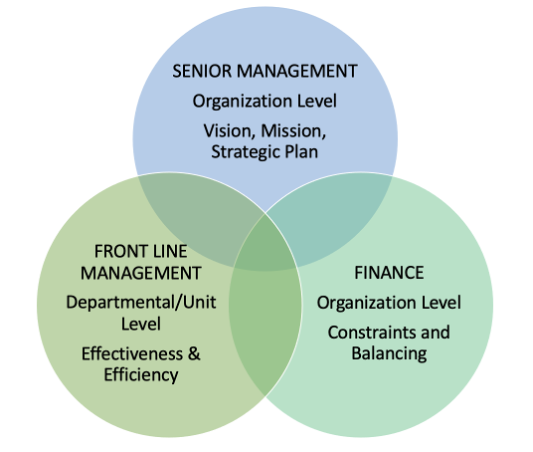Foundation and Practice of Budgeting and Financial Management

Budgets are essentially an organisation’s operating plan expressed in monetary terms. A nursing manager’s primary responsibility is to assure effective and efficient operations; financial information and understanding is essential in order to do this. Management’s primary functions are planning, organising, leading, and controlling and none of these functions can be done in the absence of financial information. A lack of financial literacy across the nursing profession increases the challenge in undertaking these primary functions (Brydges et al., 2019). All managers, regardless of their financial training, are responsible for how resources are used within their unit. Frontline managers must produce acceptable outcomes while remaining within their budgets to both reach the goals of the larger organisation as well as to receive positive feedback on the performance of their unit. While the primary responsibility of most frontline managers is not finance per se, managers are still responsible for completing tasks within the monetary constraints and guidelines of their organisation.
In order to be competent at budgeting, managers must be able to:
- Understand how the unit/clinic operates in relation to the budget and the desired outcomes for the next fiscal year
- Quantify (monetize) the work of reaching the desired outcomes
- Analyse the outcomes in relation to the budget to determine where things worked better or worse than expected.
A necessary start to meeting these competencies is understanding some of the terminology related to budgets and budgeting.
Activity #1
Watch the short video on the terminology you will encounter in talking about budgets.
Video: Budget Terms (16:16)
Slides: Budget Terms
The budgets that most managers receive are usually just a record of past expenditures. Incremental budgets are used by many organisations and these can encourage overestimation of the work that is produced, and the resources needed to do that work. Once a budget is completed and one starts to live that budget or operate under that budget, the budget then serves as a management guide.

The responsibility for ensuring the success of an organisation resides with senior management. They and the board of the corporation, if there is one, provide the vision for the organisation’s direction in the future. Finance is responsible for determining whether there is sufficient money to continue present operations and to meet future needs. Frontline managers focus on the adequacy of resources for completing the daily work of the unit for which they are responsible. Obviously, frontline managers cannot determine their expenses without referencing the larger organisational goals and restraints. Senior management and finance need to work closely with frontline managers to ensure that they understand operating processes and costs.
At the end of a fiscal year, the previous year’s budget is reviewed retrospectively to determine whether things could have been done more effectively or more efficiently. Effectiveness is a measure of whether the organisation or the unit met the goals that were laid out at the beginning of the previous year. Efficiency is the measure of the resources that were consumed in meeting those goals.
Check Your Understanding

